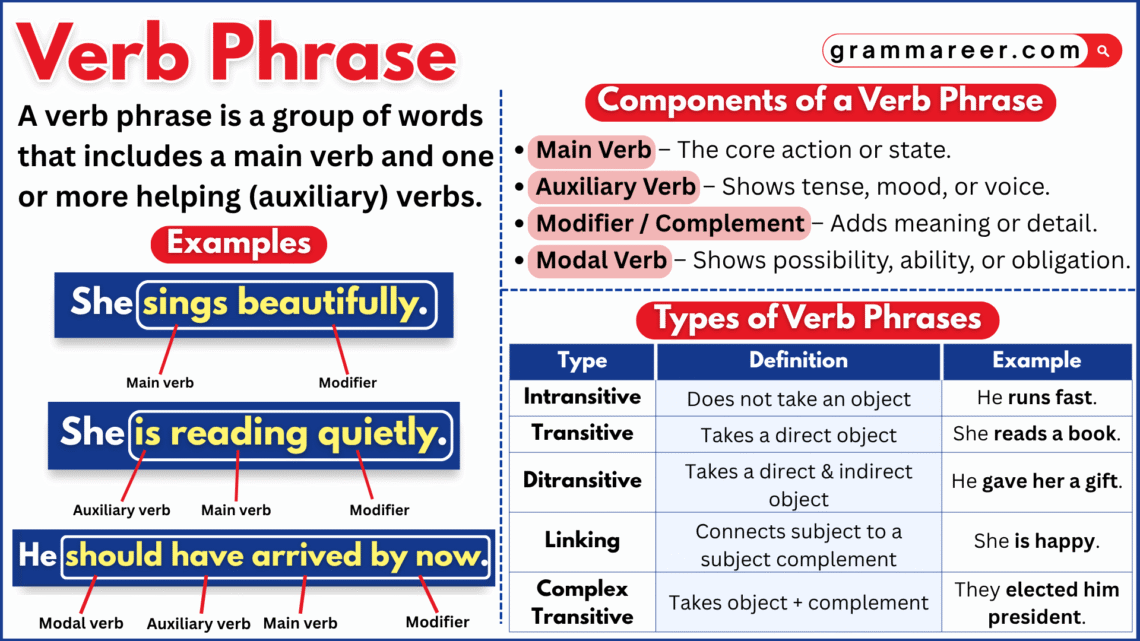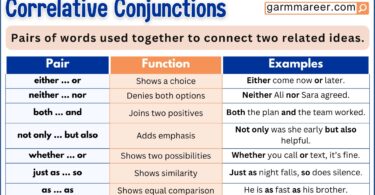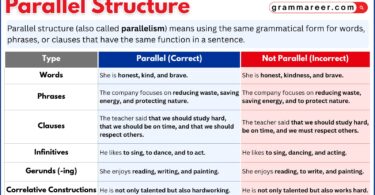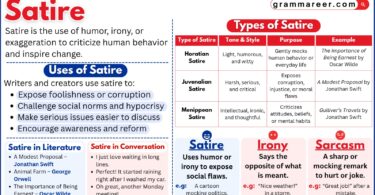A verb phrase is one of those English Grammar terms that sounds complicated but is actually easy to grasp once you understand how it works. It’s simply a group of words built around a verb that tells us what someone is doing, has done, or will do. Verb phrases help us describe actions, show time, and add clarity to our sentences. Whether you say “She is dancing,” “She has been dancing,” or “She will dance,” each phrase gives a slightly different meaning.
In this article, we’ll learn what a verb phrase is, its types, and how to use it correctly in everyday English.
Table of Contents
What Is a Verb Phrase?
A verb phrase is simply a group of words that come together to show an action or a state of being. It usually includes a main verb, which tells what’s happening, and sometimes one or more helping verbs (like is, has, was, will, or might) that add extra meaning.
Verb phrases help us understand when something happens, how long it happens, or what mood it’s said in.
Simple Verb Phrases
A simple verb phrase has only the main verb without any helping verbs. It’s direct and easy to recognize.
Examples:
- The dog barked loudly.
- We danced all night.
- I wrote a letter to my friend.
Here, the verbs barked, danced, and wrote stand alone, so they form simple verb phrases.
Complex Verb Phrases
A complex verb phrase includes a main verb and one or more helping verbs. These helping verbs add details about time, possibility, or the speaker’s mood.
Examples:
- She is reading a novel.
- They have finished their lunch.
- I will be joining you soon.
In these sentences, the helping verbs is, have, and will be work together with the main verbs reading, finished, and joining to create complex verb phrases.
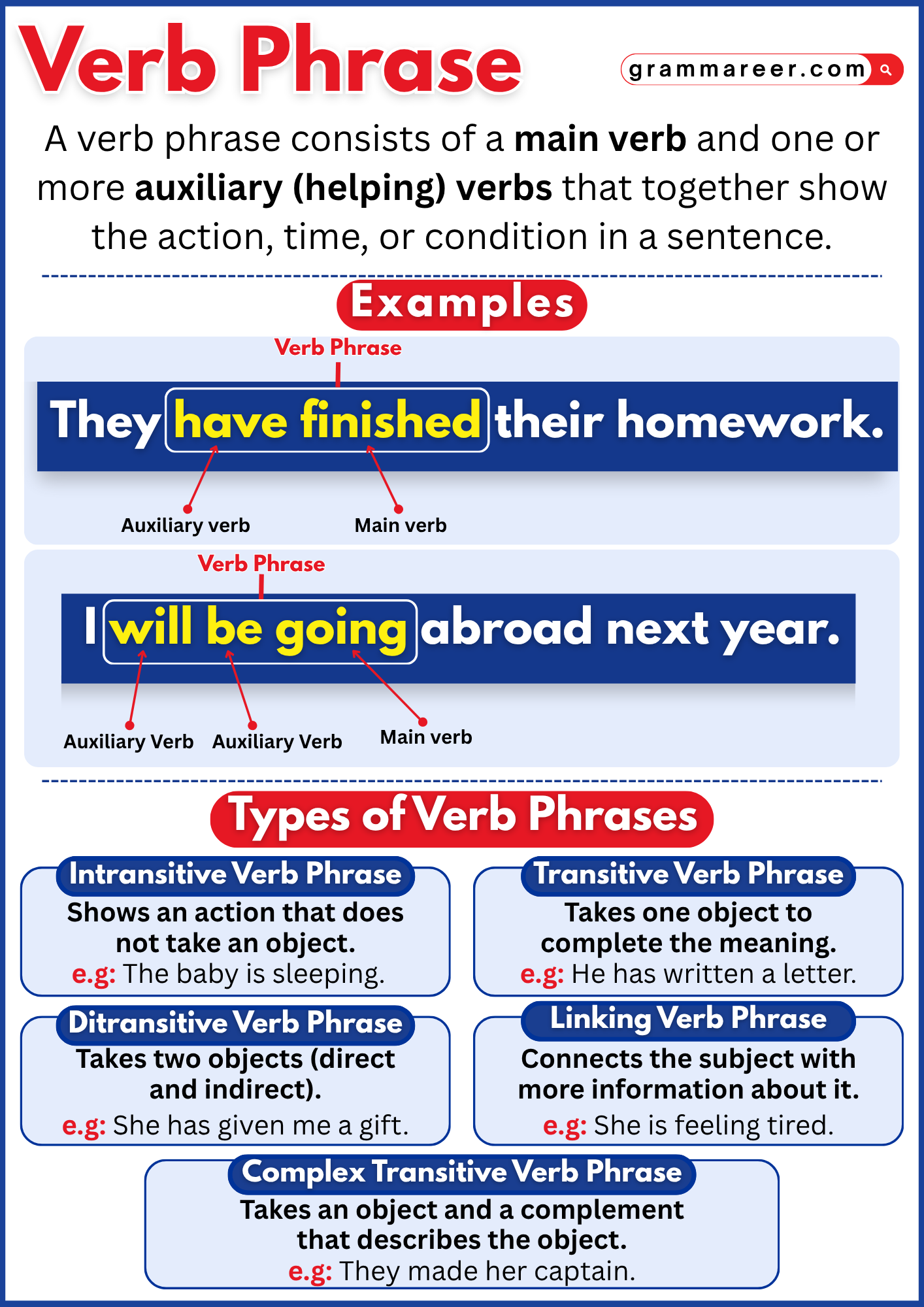
Types of Verb Phrases
Verb phrases can appear in different ways depending on what the main verb does in a sentence. Here are the five main types, each with its own simple pattern and purpose.
Intransitive Verb Phrases
An intransitive verb phrase has a main verb that doesn’t take a direct object. It shows an action or state that doesn’t pass on to something else. Sometimes it’s just one verb, and sometimes it includes helping verbs or modifiers.
Examples:
- The baby slept peacefully.
- The sun will shine tomorrow.
In both examples, there’s no direct object receiving the action. The verb stands on its own.
Linking Verb Phrases
A linking verb phrase connects the subject to more information about it, usually a subject complement (like a noun or adjective). These verbs don’t show action but describe a state or condition.
Examples:
- She is a talented singer.
- They have become close friends.
Here, the verbs link the subject (she, they) to what describes them (a talented singer, close friends).
Transitive Verb Phrases
A transitive verb phrase includes a main verb that needs a direct object to complete its meaning. The action moves from the subject to the object.
Examples:
- He cleaned the kitchen.
- Maria has written a letter.
The verbs cleaned and has written both show actions done to something — the kitchen and a letter.
Ditransitive Verb Phrases
A ditransitive verb phrase has two objects. The first is an indirect object (the receiver of the action), and the second is a direct object (the thing being given or acted upon).
Examples:
- The teacher gave the students homework.
- I sent my friend a message.
Here, the students and my friend receive something, while homework and a message are the things given.
Complex Transitive Verb Phrases
A complex transitive verb phrase has a direct object followed by an object complement, which gives more information about the object.
Examples:
- We painted the walls blue.
- She made him angry.
The words blue and angry describe the objects the walls and him, completing the idea of the action.
How to Use Verb Phrases?
Verb phrases do more than just show actions. They also tell us when something happens, how it is expressed, and who performs the action. In English, verb phrases can show tense, mood, and voice. Let’s look at how each of these works with simple examples.
Verb Phrases Showing Tense:
Verb phrases help us understand when an action takes place, such as in the past, present, or future. They also tell us if the action is still happening or already completed.
Examples:
- Sarah was reading a book last night.
- (The action happened in the past and continued for some time.)
- Sarah will have finished her book by tomorrow.
- (The action will be completed at a future time.)
Verb Phrases Showing Voice:
Verb phrases can also show voice, which tells us whether the subject is doing the action or receiving it. There are two main types: active voice and passive voice.
Examples:
- Sarah baked a cake.
- (This is active voice because Sarah is doing the action.)
- The cake was baked by Sarah.
- (This is passive voice because the cake receives the action.)
The active voice focuses on the doer of the action, while the passive voice focuses on the receiver.
Verb Phrases Showing Mood:
Verb phrases can also show the mood of a sentence, which tells us whether it is a statement, a question, or a command.
Examples:
- Sarah sings beautifully.
- (This is a statement and shows the indicative mood.)
- Sing a song for us, Sarah.
- (This is a command and shows the imperative mood.)
- Will Sarah sing tonight?
- (This is a question, which also belongs to the indicative mood.)
The mood helps the listener understand what kind of message the speaker is giving.
The Order of Verbs in a Verb Phrase
When we use a verb phrase, the verbs always follow a certain order. The main verb comes last, and any helping verbs come before it. This order helps the sentence sound natural and grammatically correct.
Here’s the general order:
- Modal verb (like can, may, might, should, will)
- Have (to show perfect tenses)
- Be (to show continuous tenses)
- Be (to show the passive voice)
- Main verb (the main action word)
Let’s look at how this works in real sentences.
Examples:
| Subject | Modal Verb | Have | Be (for tense) | Be (for passive) | Main Verb | Sentence |
|---|---|---|---|---|---|---|
| Emma | — | — | — | — | reads | Emma reads every night before bed. |
| Emma | — | — | was | — | reading | Emma was reading when the lights went out. |
| Emma | — | had | — | — | read | Emma had read that book before. |
| Emma | — | has | been | — | reading | Emma has been reading for two hours. |
| Emma | might | have | been | — | reading | Emma might have been reading when you called. |
| The cake | — | has | — | been | baked | The cake has been baked perfectly. |
| The cake | could | have | — | been | baked | The cake could have been baked earlier. |
| The cake | may | have | been | being | baked | The cake may have been being baked when we arrived. |
Verb Phrase vs Verbal Phrase
People often confuse verb phrases and verbal phrases because they both include verbs. But their roles in a sentence are quite different.
| Verb Phrase | Verbal Phrase |
|---|---|
| A verb phrase shows the action or state in a sentence. It includes the main verb and any helping or modal verbs. | A verbal phrase looks like a verb but doesn’t act as one. Instead, it works as a noun, adjective, or adverb. |
| Example: She has finished her homework. | Example: Running every morning keeps me active. |
Verb Phrase vs Phrasal Verb
These two may sound similar, but they’re not the same. A verb phrase shows the action and its timing, while a phrasal verb changes the meaning of the main verb completely.
| Verb Phrase | Phrasal Verb |
|---|---|
| A verb phrase includes a main verb and one or more helping verbs to show tense, mood, or voice. | A phrasal verb is made up of a verb plus a preposition or adverb that changes its meaning. |
| Example: They have been studying for hours. | Example: She looked after her little sister. |
Noun Phrase vs Verb Phrase
Noun phrases and verb phrases work together to build complete sentences. The noun phrase usually names the person or thing, and the verb phrase tells what’s happening.
| Noun Phrase | Verb Phrase |
|---|---|
| A noun phrase centers around a noun or pronoun and acts as a subject, object, or complement. | A verb phrase centers around the main verb and tells what action is happening. |
| Example: The little puppy slept peacefully. | Example: The puppy was sleeping peacefully. |
FAQs About Verb Phrases
A verb phrase is a group of words that together act as the verb in a sentence. It usually includes a main verb and one or more helping (auxiliary) or modal verbs.
For example: She has been studying all evening.
To spot a verb phrase, look for the main action word and any helping verbs that come before it. These helping verbs often show time, mood, or possibility.
For example: They will be arriving soon. Here the verb phrase here is will be arriving.
Sure! Here are a few examples of verb phrases used in everyday sentences:
◉ He is playing the guitar.
◉ They have finished their lunch.
◉ She might call you later.
◉ We had been waiting for hours.
◉ I will go to the market tomorrow.
You May Also Like

